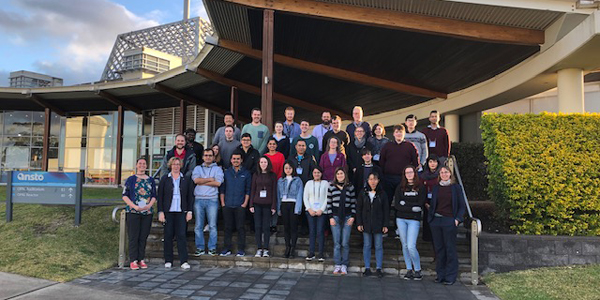Traditional HZB Neutron School will be continued at ANSTO in Australia

The neutron school at ANSTO in cooperation with HZB experts could transfer knowledge and skills in neutron research. © ANSTO
This summer, researchers at the Australian neutron source ACNS organised a joint neutron school at Australia's Nuclear Science and Technology Organisation ANSTO. The HZB-ANSTO neutron school will take place every two years.
The first joint HZB-ANSTO neutron school took place from 23 to 28 June 2019 at ANSTO. HZB experts Prof. Dr. Bella Lake and Prof. Dr. Susan Schorr held several lectures. The interest in the neutron school was high, 24 participants were selected from 60 applications. In addition to lectures, hands on trainings on three instruments of the neutron source ACNS at ANSTO have been offered.
“Certainly we were inspired by the all-encompassing nature of the Berlin school - I believe that our plan going forward would be to run a 'general' neutron school every two years and a more specific school in between," said Dr. Helen Maynard-Casely, one of the organisers at ANSTO.
Shortly before the start of the neutron school, the SPATZ neutron reflectometer at ACNS was inaugurated. SPATZ, formerly known as BioRef at the BER II at HZB, is ideally suited for studies of soft matter in biomedicine, energy and materials. It was donated by HZB to ANSTO since the BER II neutron source will be shut down end of 2019.
In a short video, ANSTO presents SPATZ and its virtues.
arö
https://www.helmholtz-berlin.de/pubbin/news_seite?nid=20628;sprache=en
- Copy link
-
Element cobalt exhibits surprising properties
The element cobalt is considered a typical ferromagnet with no further secrets. However, an international team led by HZB researcher Dr. Jaime Sánchez-Barriga has now uncovered complex topological features in its electronic structure. Spin-resolved measurements of the band structure (spin-ARPES) at BESSY II revealed entangled energy bands that cross each other along extended paths in specific crystallographic directions, even at room temperature. As a result, cobalt can be considered as a highly tunable and unexpectedly rich topological platform, opening new perspectives for exploiting magnetic topological states in future information technologies.
-
AI re-examines dinosaur footprints
For decades, paleontologists have pondered over mysterious three-toed dinosaur footprints. Were they left by fierce carnivores, gentle plant-eaters, or even early birds? Now, an international team has used artificial intelligence to tackle the problem—creating a free app that readily lets anyone decipher the past.
-
HZB expert appointed chair of the Scientific Advisory Board of the Barcelona Research Centre
Prof. Dr. Susan Schorr has been appointed to the newly established Scientific Advisory Board of the Barcelona Research Centre in Multiscale Science and Engineering and elected as its chair.
